 In this June 27, 2007 file photo, a Continental Airlines aircraft lands at Newark Liberty International Airport in Newark.
In this June 27, 2007 file photo, a Continental Airlines aircraft lands at Newark Liberty International Airport in Newark.Airlines and federal officials began stricter enforcement of personal identification standards today, meaning passengers must now supply their full name, date of birth, and gender when reserving a ticket. Then, at security checkpoints, they must show ID that matches the information on their boarding pass.
If not, and you can’t provide proof of the mistake, there’s no getting on the plane.
Under the Transportation Security Administration’s Secure Flight program, passengers who fail to provide the complete information will not be issued a boarding pass.
Although the program was adopted in June, strict enforcement of the requirement was delayed for five months to allow airlines time to adjust. In the past, airlines had more discretion when a document did not exactly match the information on a ticket.
PREVIOUS COVERAGE:
• Three people set off security alert while trying to catch flight at Newark airport
• Federal security officials debut controversial full-body scanners at Newark airport
• JFK Airport tries out full-body scanners
• Training exercise will bring planned mayhem to Newark Airport
Now, if a middle initial does not match the middle name, or if there is a difference in the sex or birth date of the passenger, he or she will have to go back to the airline ticket counter to clear up the discrepancy before boarding.
Ann Davis, spokeswoman for the TSA, said the agency does not anticipate added delays or annoyances for passengers. "I think most people know what full name means," she said.
Even if a travel agent, secretary or spouse has not provided a passenger’s correct information while booking a ticket, Davis said, most wrinkles could still be ironed out immediately.
David A. Castelveter, a spokesman for the Air Transport Association, the airline industry’s main trade group, anticipated few problems.
"You simply go to the ticket counter and they resolve it," Castelveter said. "They’re not going to be canceling reservations."
"Unless you’re a bad guy," he added, and the discrepancy cannot be reconciled. In that case, he said, the system has done its job.
As with pat downs, metal detectors and full-body scanners, passengers seemed to take the latest security measure in stride. "You can’t fault them," said Gloria McKenney, a white-haired woman waiting to be screened today for her flight from Newark back home to Portland, Ore. "They’re doing what they can do to protect us."
Airlines could have something to be thankful for this month — with a 3.5 percent increase forecast for the 12-day Thanksgiving travel season. The Air Transport Association said survey data indicates 24 million Americans will take to the skies from Nov. 19-30, with Sunday, Nov. 28, projected to be the busiest single travel day.
It’s welcome news for the airline industry, which had a disappointing Thanksgiving holiday a year ago, reflecting a decline in passenger trips on the year overall.
"Any increase is good, make no mistake about it," Castelveter said. "The economy’s recovering, it’s healthier — not a healthy, but a healthier economy. People still have an urge to travel. People recognize that it’s a fast and efficient way of getting to their destination. And fares are still affordable."
Affordability is relative, however. Fares have risen sharply since the spring, largely offsetting steep fare cuts over the winter and all of last year that reflected a slowdown in air travel.

